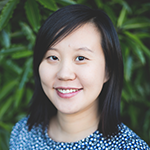On Sitting In A Formal Garden After Explaining To A Curator Why A British Institution Shouldn’t Sell Original Cultural Revolution Posters In Its Gift Shop
Tulip buds in a dense perfect circle
amist lawn that needs no sprinklers. I think of California’s
layered air, driving past patches of blackened forest,
the smell of burned couches and electric pressure cookers
through our masks — I removed mine to kiss her goodbye.
Pins of rain waken me to this garden, petaled
flowerpots on pedestals, mothers gliding prams on
oversized wheels, lanes rounding the lawn. Or are they
buggies or are they pushchairs? Willows accompany
two parallel ponds. In a corner beyond my eye,
the raised bed where my daughter sowed wildflower
seeds provided by a curly haired park ranger,
tiny hands now patting, now scraping, now massaging,
now tunneling into soft composted earth. And what of these posters,
some even possibly drawn by my twenty-year-old mother,
glad for any commissioned break from her shift on
machines spinning cotton. How her fingers curled
as she shaded sleeve to collar, handle to the neck
of a hammer, the clock ticking as she practiced lips.
How her breath quickened in the last minutes before
her return to the floor, erasing errant pencil lines.
And where did the posters live after they were peeled off walls –
rolled into calendars featuring Teresa Teng every month?
Folded and tucked between books with covers wrapped
in newspaper, their titles penciled over newsprint, the posters
biding their time through market reform, knowing they’d be
wanted again in a London home with vinyl records?
Or perhaps the posters are not originals afterall – a British
gallery cheating British gallery goers, and have nothing
to do with cotton, or Teresa Teng, or my mother.

Rona Luo is a poet and acupuncturist based in London, UK. She currently serves as a mental health consultant for Kundiman, a non-profit dedicated to nurturing Asian American literature. She is working on a hybrid manuscript on her family’s role as Han Chinese colonizers on Hmong land.

 BACK TO ISSUE
BACK TO ISSUE